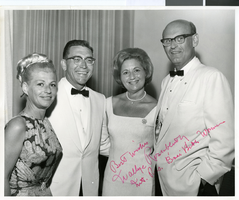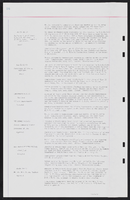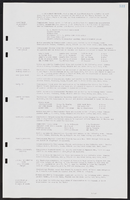Search the Special Collections and Archives Portal
Search Results

Transcript of interviews with Al Levy by Cheryl Caples, February 23, 1979 and by Martha Zehnder, March 8, 1981
Date
Archival Collection
Description
Part I: Interview with Al Levy by Cheryl Caples on February 23, 1979. At the time of this interview, Levy was serving on the city commission (now the Las Vegas City Council). He talks about growing up in Las Vegas and attending Las Vegas Grammar School (Fifth Street School) and Las Vegas High School. He mentions the Helldorado events, recreational activities, and raising a family in Las Vegas. Part II: Interview with Al Levy by Martha Zehnder on March 8, 1981. Levy recalls much of the same information as the previous interview, and again talks about his schooling and attending the University of Southern California. He returned to Las Vegas to assist his father with his grocery stores. Levy talks about the polio epidemic as the reason that children were not allowed to swim at public or hotel pools. He discusses his real estate firm, Levy Realty Company, his involvement in the community and the Jaycees (Junior Chamber of Commerce), and the booming hotel industry. Levy also discusses some city leaders he's known, including Mayor Gragson. He talks about his Jewish faith and having to go to Los Angeles to train for his bar mitzvah because there were no rabbis living in Las Vegas.
Text
Milton I. Schwartz oral history interview
Identifier
Abstract
Oral history interview with Milton Schwartz conducted by Claytee D. White on May 03, 2004 for the Boyer Early Las Vegas Oral History Project. Schwartz discusses working at the Flamingo Hotel right after World War II, starting Valley Hospital and owning many other businesses. He also talks about having a Hebrew academy named after him in Israel, and owning the Yellow-Checker-Star Cab Company. Other topics Schwartz discusses includes being active in the Republican Party and bringing the first medical helicopters to Nevada with a few partners.
Archival Collection
Burton Cohen oral history interview
Identifier
Abstract
Oral history interview with Burton Cohen conducted by Claytee White on January 09, 2009 for the Boyer Early Las Vegas Oral History Project. In this interview, Burt reflects on the positions he held in numerous famous Las Vegas, Nevada Strip casinos, the celebrities he hired and befriended, and offers a unique look at the behind the scenes marketing and entertainment strategies that he helmed. He shares stories of becoming entrenched in casino operations and his reflections of union experiences.
Archival Collection
Stuart Mason oral history interview
Identifier
Abstract
Oral history interview with Stuart Mason conducted by Claytee White on November 09, 2006 for the Boyer Early Las Vegas Oral History Project. Mason discusses his company, Taylor Construction, and gives an overview of the hotels the company has built and background information about them. He then describes moving to Las Vegas, Nevada to build Caesars Palace in 1964 and how the Civil Rights Movement impacted the construction scene. He then talks about old and new building projects, and the differences between being his own boss and working for someone else.
Archival Collection

Photograph of Assemblywoman Eileen Brookman, Governor Grant Sawyer and Wallye Rosenbluth, 1965-1968
Date
Archival Collection
Description
Image

Transcript of interview with Morris "Moe" Dalitz by Brenda Baxter, November 4, 1977-March 30, 1978
Date
Description
Interview with Morris "Moe" Dalitz by Brenda Baxter, on several dates in late 1977 to early 1978. In this interview, Dalitz talks about his business and career endeavors before coming to Las Vegas, which included a laundry service and military service. Dalitz partnered with Wilbur Clark and became a successful hotel and casino owner in Las Vegas, as well as a real estate developer with properties including the Boulevard Mall and Sunrise Hospital.
Moe Dalitz was born in Boston in 1899, and soon after his family moved to Detroit, Michigan and where his father started a linen supply company. In 1930, during Prohibition, Moe moved to Cleveland, Ohio and he became involved with the then-illegal liquor business. At the age of 41, Dalitz enlisted in the Army and was stationed at Governors Island. Moe was put in charge of laundries and dry cleaning because of his experience in the laundry business. He played an important role in creating mobile laundry units that were used in the front lines in North Africa. His ingenuity won him a non-combatant award for his "unusual interest, ingenuity and talents" applied during his service. At the end of war, Moe returned to Cleveland, where his partners were successfully carrying on their business. It was then that they decided to go into the casino-nightclub business, opening nightclubs in Ohio and Kentucky. A couple years later, Moe and his partners met Wilbur Clark and agreed to finance his inactive project in Las Vegas. Thus, in 1950, the Desert Inn Hotel and Casino opened, and Moe Dalitz ushered in a new era for the city. Moe and partners continued to elevate the sophistication of the Strip when they acquired the operating lease to, and later part ownership of, the Stardust Hotel and Casino. Moe was instrumental in bringing the French Lido de Paris show to the Stardust, which was considered the most spectacular nightclub show produced in Las Vegas at its time. In addition to his gaming industry ventures, Moe engaged in significant real estate development, along with partners Allard Roen, Merv Adelson and Irwin Molasky. Their projects included Sunrise Hospital, The Boulevard Mall and Las Vegas Country Club as well as La Costa Resort and Spa in California. At the time of the interview, Moe was involved with the construction of a downtown hotel and casino. Moe Dalitz was the recipient of the Humanitarian Award from the American Cancer Research Center, and supported the Variety Club and the Home of the Good Shepard, amongst other charities.
Text




